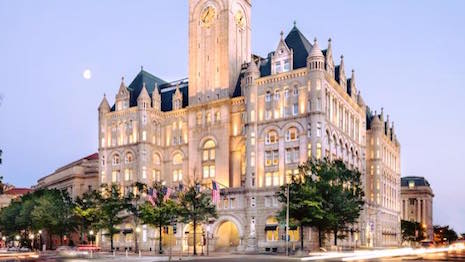- About
- Subscribe Now
- New York,
July 23, 2018

 Politics can be useful but also divisive for luxury brands. Image credit: Trump Hotels
Politics can be useful but also divisive for luxury brands. Image credit: Trump Hotels
There is a significant correlation between the desire for luxury goods and political conservatism, according to a new study.
Several marketing professors at INSEAD published a paper called “How Consumers’ Political Ideology and Status-Maintenance Goals Interact to Shape Their Desire for Luxury Goods,” looking to establish correlations between political leanings and luxury consumption. The report found that conservatives tended to desire luxury goods more, which the paper attributes to the desire to maintain their socioeconomic status.
“We found that Republicans with high social status were 9.8 percent more likely than high-status Democrats to buy a luxury car," said David Dubois, associate professor of marketing at INSEAD, Fontainebleu, France. "Intrigued, we dug a little deeper and discovered that while high-status Democrats spent $29,022 on average, their Republican counterparts were spending $33,216 on cars.
"For luxury car sellers that meant a median difference of 14.45 percent increase in sales to conservative customers."
Left or right
Luxury consumption has always, at some level, been about status.
When customers spend an inordinate amount of money on a pair of sunglasses, there is a baseline desire to establish one’s status as someone who can afford to do so.
This idea was the focus of INSEAD’s research, which looked at how customers of various political persuasions viewed luxury consumption.
The Trump hotel in Panama is working to abandon the Trump name and disassociate from the Trump Organization. Image credit: Trump Organization
In one study, INSEAD asked customers to rate their likelihood of purchasing an expensive pair of headphones whether they were marked as luxury or not. Conservative-leaning customers were much more likely to be swayed by the idea that the headphones would be perceived as a luxury good and that they in turn would be perceived as being of high status.
What is notable is that this distinction is held among consumers of comparable means. A wealthy person with liberal politics would be less likely to flaunt their wealth than a conservative with similar financial status.
Political inclinations
Political persuasion can be a useful thing for brands to observe about their customers, particularly since it can be a relatively reliable barometer of feelings towards luxury.
According to a new study, hospitality group Trump Hotels has the widest gap in net favorability between Democrats and Republicans.
Topping Morning Consult’s “Most Polarizing Brands in America” list, the hotel brand founded by President Donald Trump is looked at far more positively by those in his own Republican party. Throughout his campaign and first year in office, the politician’s actions and words have been intensely controversial, impacting reception of his hospitality chain among those with differing political views (see story).
But brands need to be careful about wading into politics. What would be appealing to some can be alienating for others.
Italian fashion label Moschino’s latest advertising campaign is attracting criticism on social media for its approach to a heated political debate.
Moschino's fall/winter 2018 campaign has drawn controversy. Image credit: Moschino
For fall/winter 2018, the brand’s American creative director Jeremy Scott took aim at the U.S. administration’s handling of “illegal aliens” by turning models into otherworldly figures. While the campaign was intended to humanize the topic, the effort has drawn criticism (see story).
“This is a very accessible tool for luxury brands," said Brian Park, co-author of the report. "Political affiliations can be determined along geographical lines – and there are tons of granular data easily accessible that enable brands to enact a segmentation based on political ideology."
Share your thoughts. Click here